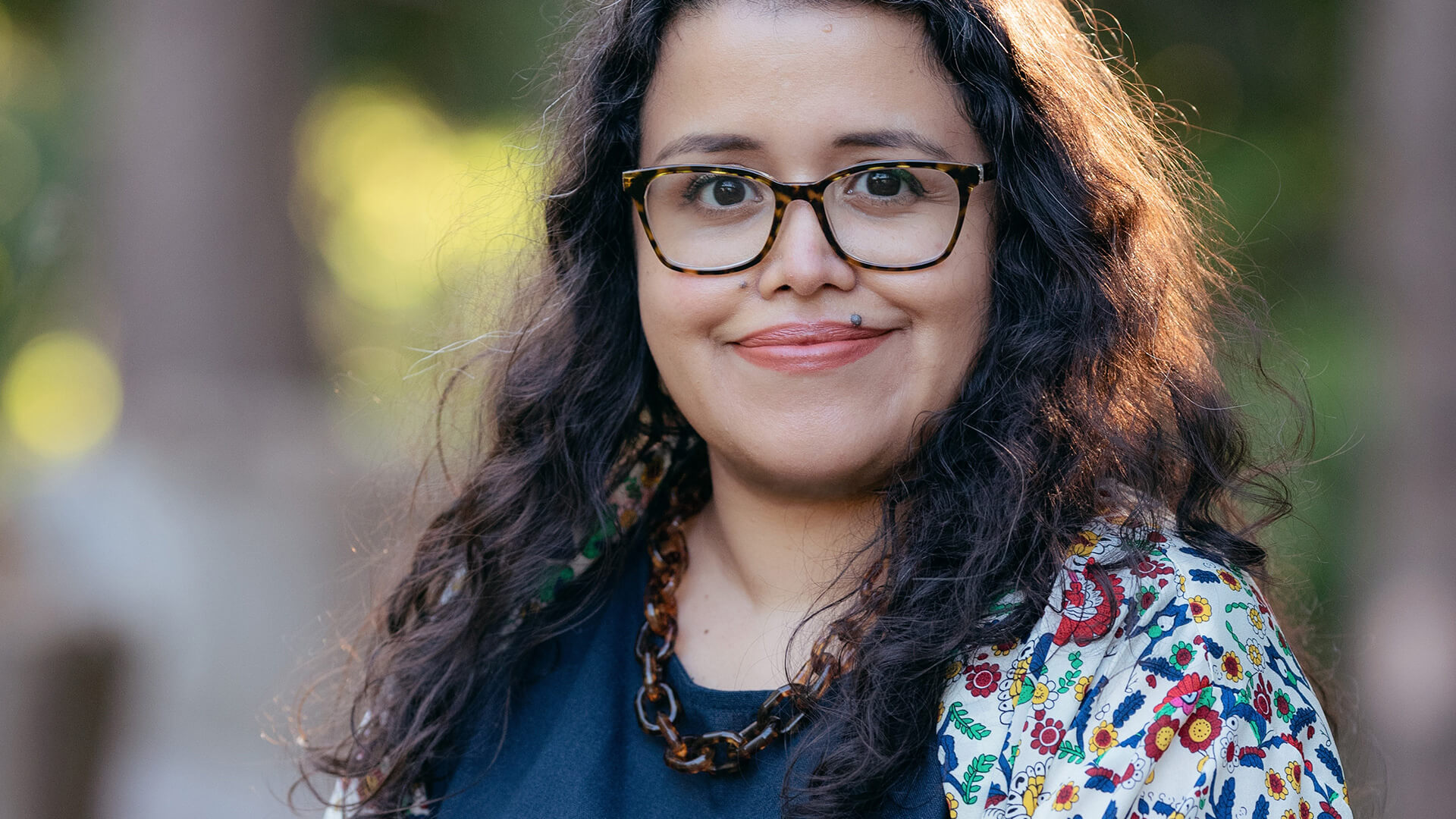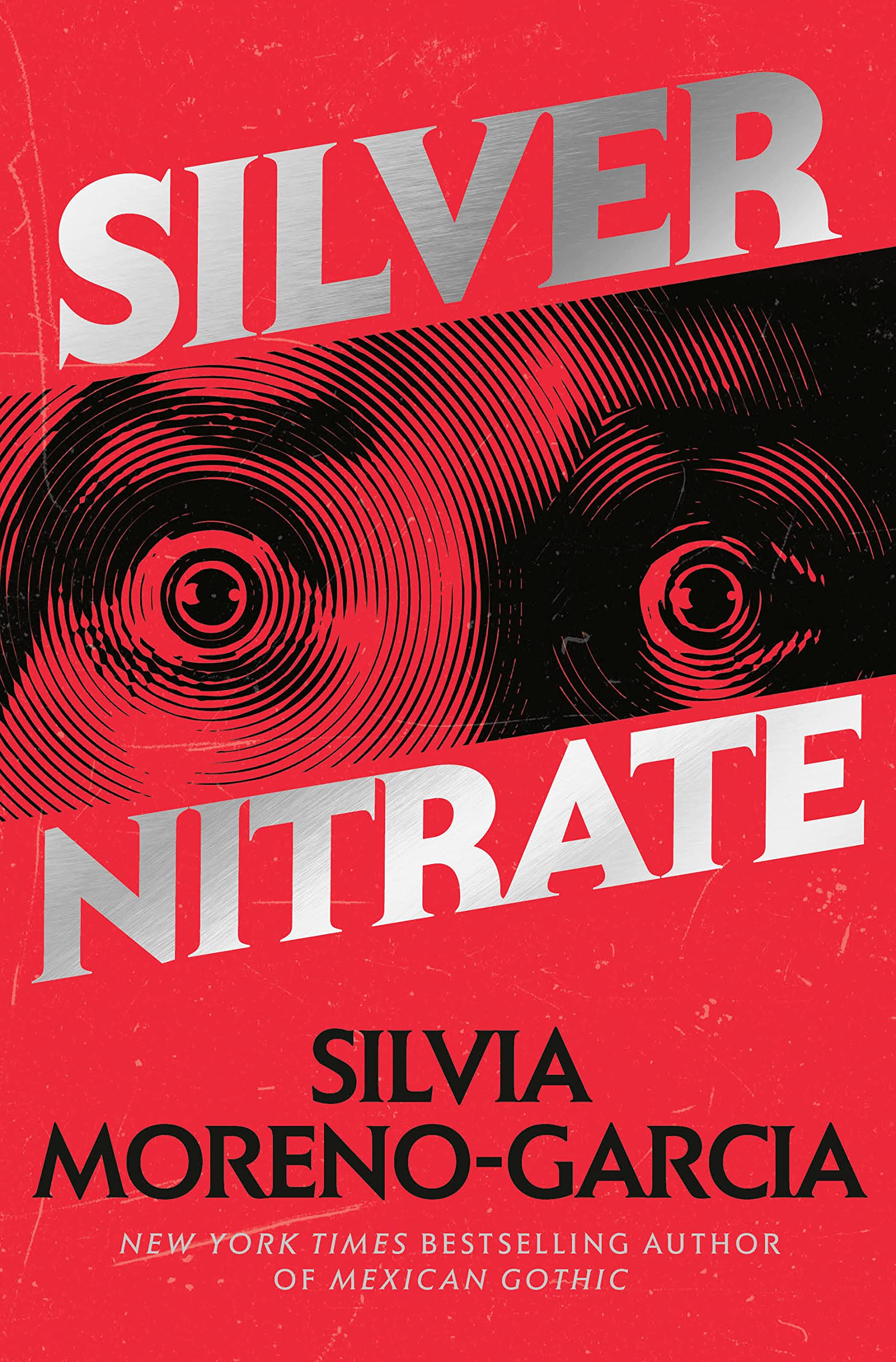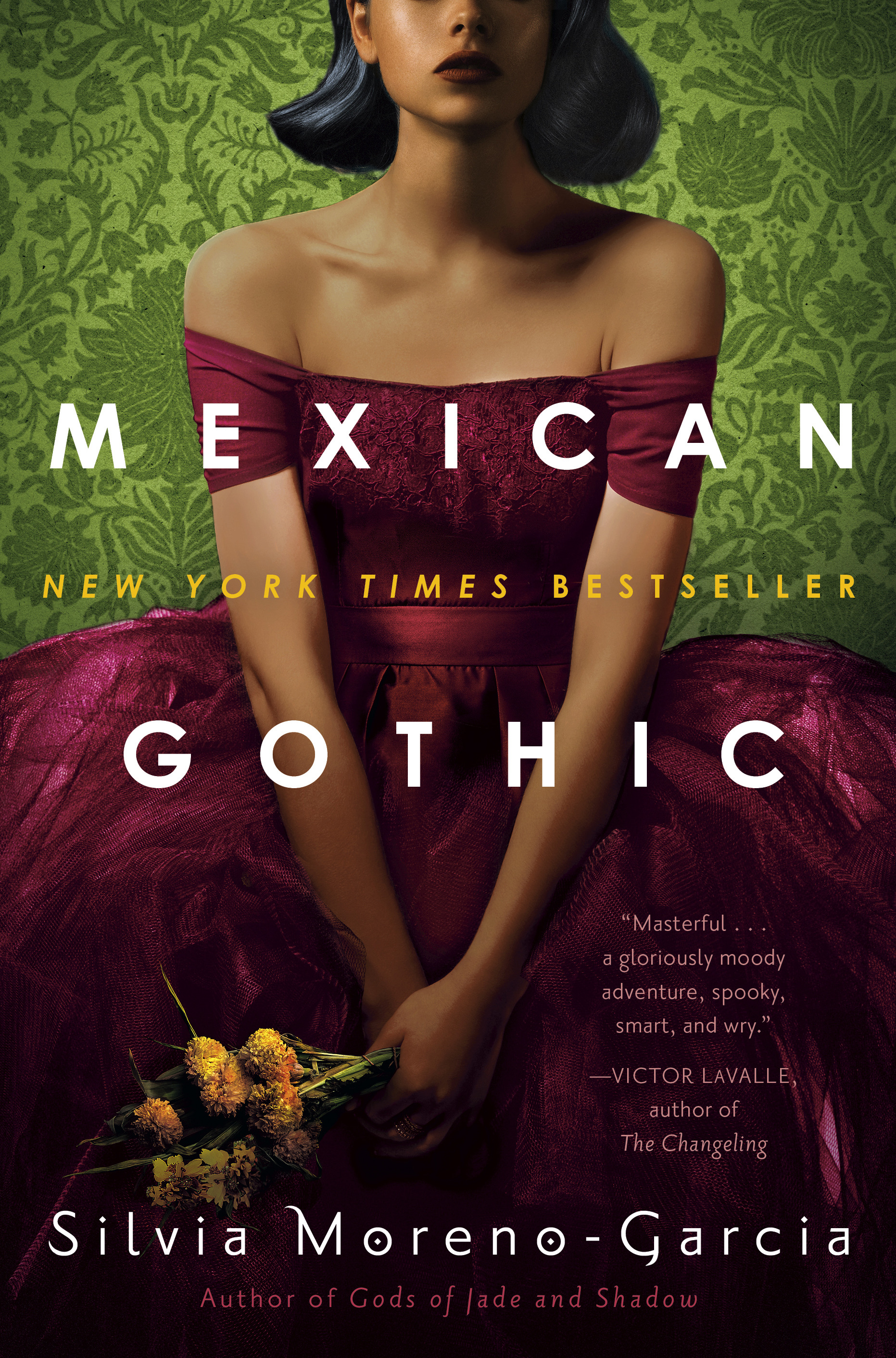
With her ninth novel, “Silver Nitrate,” Silvia Moreno-Garcia has cemented her reputation as one of the most prolific contemporary novelists of our time. The novel follows lifelong friends, Montserrat and Tristán. The duo finds themselves confronted by Nazi occultism worked into the physical reels of an incomplete film made decades ago. Silvia does what she does best, and that is build a world that is very utterly believable, down to its smallest details. In this case, it is the world of sound editing for films in the nineties, as well as that of Nazi occultism in Mexican horror films of the fifties and sixties. The result is an exciting novel full of suspense, horror, and intrigue. It is an ode to the captivating force of cinema, specifically horror. We chatted with Silvia about her new work, the world of publishing, and of course, writing.
In “Silver Nitrate” you explore the world of Mexico’s B horror films. You wrote within the genres of horror in “Mexican Gothic”, noir in “Velvet Was the Night”, and fantasy in the “Daughter of Doctor Moreau”. You’ve mentioned that you get bored easily and love to switch genres. When you start a new work, do you consciously choose the genre? Your novels pay homage to each genre with heavy research. Do your novels spawn from the challenge of writing in a genre? Do the genres shape your stories? Do the genres allow you to take the story further than you initially thought?
It depends on the book, my first novel “Signal to Noise” developed more organically. Then there are books like “Gods of Jade and Shadow” which is a hero’s journey, a quest narrative. That was a challenge I set for myself.
What do you think about the literary world’s obsession with excluding genre fiction?
I was reading a piece yesterday about the invention of the category “literary fiction”. It wasn’t invented too long ago. These categories change and mould over time for a variety of reasons. Some are commercial reasons, some are pushed by the industry, others are organically created by the readers. Someone notices something interesting so they decide to cater to that market and a new category develops. That’s what happened to the gothic novel revival of the 1960s.An editor at Ace noticed that women were reading a lot of gothic work, “Wuthering Heights” and “Jane Eyre” kind of novels, and he started publishing more of that which resulted in a mini boom in gothic novels. You’ll see books in bookstores where a woman is running away from a castle on the cover. That was someone seeing a trend and giving it a name.
Sometimes publishing creates a category. They say this is something, we’ll tell you what it is and tell you to write into it. Categories are strange things to tend to. Sometimes you go to a bookstore and don’t find a book where you expect to find it. Would you find “Frankenstein” in the science fiction section of the bookstore or literary section? That in itself is an interesting question. Questions about genre are both contextual and chronological. I don’t think it’s important to colour between the lines.

“Silver Nitrate” is your ninth novel since your first, “Signal to Noise” in 2016. Your output is incredible. What motivated you to produce so much work, especially in the early days of your career? What would you attribute your perseverance to? Do you give yourself tight timelines to produce drafts and edits?
The work life of a full time freelance writer is different from the work life of a part time freelance writer. When I was working a nine to five, I had that to pay my bills. So if I wrote one short story a year or a novella it was fine. Right now, I am full time freelance writer, that means my writing must pay my bills, and it means I have to fulfill certain contracts. I’m also doing lots of other things at the same time.
I think that’s one of the biggest misunderstandings of what a writer is. A writer is a freelancer. A full time writer is a full time freelancer. Just like a journalist nowadays is not employed nine to five by a newspaper like in the olden days. If I’m not writing a book, I need to be doing something else to make money. The easy answer is that my bank account needs to have a certain amount of dollars in it. Having worked in other capacities before, in communications and journalism, I’m used to that life. I just have to juggle everything and make it work. The good thing is that although books have strenuous deadlines, they are longer. Shorter pieces have shorter deadlines.
What is your mindset when approaching novel length works? You’ve mentioned that you spend a lot of time in research and then like to have an idea of where you’re going. When do you usually know you’ve got a novel-worthy idea on your hands?
I always have stuff and a folder full of ideas. At this point, I can go on proposal with my editorial team, I don’t have to write the whole thing like I used to. I tell them this is what I’m thinking of, what do you think? And they tell me, yes, we would like to see that, and then I write the book in question. Before I’d write something and we’d see if we could sell it. That was the case with several of my novels. But now I have a long term relationship with my publisher and editors. The relationship is different now. I normally give them two to three different ideas at a time.
You have mentioned that you’ve always been inspired by horror films. But you have also been working on the Hulu series of “Mexican Gothic”. How much of the experience of developing the series inspired you to write about the behind the scenes of filmmaking in “Silver Nitrate”?
None of it because nothing has happened. The book was auctioned, which doesn’t mean it goes into production. It just means the rights have been acquired. They may do something with it or they may not. In 90% of the cases, nothing happens. I don’t have much experience from that but I worked in post-production for a period of time when I was younger. So I know a little bit of that world, and I grew up in a family that worked in radio. I grew up around an editing base that was dedicated to audio. Which is a different medium but similar in many ways.

You live and write in Vancouver while your books are read all over the world and especially embraced in the US. Would you say that geographical location isn’t that important anymore for being a writer? And what has your relationship with Canadian publishing been like? You have found great success in the US and I was wondering if Canadian publishing maybe is a little behind with pushing the frontiers of what new fiction can look like.
It depends on the type of writing somebody is engaged in. For genre fiction it is different. There are no big genre imprints in Canada. In the US we have Tor books, Ace, my own publisher, Del Rey, part of Penguin Random House and others. So you’re going to end up with an American publisher any way if you write genre fiction. For literary writing there are more imprints in Canada. It depends on what kind of writer you want to be and what kind of work you want to be doing.
For me it never made sense to move from Vancouver because I had a full time stable job here. I was working in communications. Why would I move to Toronto where I’d be unemployed? One good thing about being a genre writer is that genre isn’t considered as important, so there’s less of a feeling of oh I want to be published by the important publishers because who are the important publishers of horror? It’s not like oh I’ll never make it in horror if I don’t move to Toronto.
The internet also changed things in a lot of ways. For example, being able to send manuscripts by email was a big game changer. Being able to have a phone conversation that isn’t super expensive was incredibly helpful. After Covid, most of the people at my agency stopped coming into the office full time. Some people moved away from New York. There has been a shift towards allowing work to be remote. So they can’t expect their writers to be in New York when staff isn’t in New York.
Will it last? Well, I don’t know that. For writers, you don’t have to be in the big city to be noticed.
A lot of writers move to these hubs to be in community with other writers. How important is it for you to be in community with other writers?
I don’t need community that much. Would I necessarily want to get together with writers that have nothing in common with me and don’t write the stuff that I write? They are just writers, right? Would that make any sense? Just because we share the same profession doesn’t mean we share the same aesthetic goals.
I spend more time online with people who are more interested in the things that I am interested in, even if they are in Brisbane or in Berkley. We get together online and chat. I don’t know a lot of writers in Canada. I know some in the Lower Mainland and we get together to have our Dungeons and Dragons monthly gaming sessions. That’s what we do! I’m a member of the Writers Union and I attend their seminars and see what people are talking about online. It can be isolating sometimes in person but not online.
Vancouver is also an expensive city. A lot of my friends have moved away. I’m still here, but what am I going to do? I’m not moving to Winnipeg though. Not doing that yet. That’s the good thing about the internet, you end up making better connections there sometimes. Maybe here everybody is writing memoirs, and I’m not! (laughs)

“Mexican Gothic” came out in 2020 right as the pandemic began. There was anxiety around the fact that books released them would get lost in the chaos but “Mexican Gothic” did incredibly well. During the pandemic you released “Velvet was the Night” and “The Daughter of Doctor Moreau”. How would you say the pandemic changed you as a writer, in your habits, in the way you see your craft, and the stories you want to tell?
I don’t think it changed me that much. I’ve been doing the same thing that I was doing before except that I was doing my nine to five job from home in the pandemic. I wasn’t getting on a bus to commute. I wasn’t reading on the bus anymore. That was strange.
It was a strange time; we didn’t know what was going to happen with the book. The original print run of “Mexican Gothic” was 12,000 copies which isn’t a lot. You can’t make a bestseller out of that. But that’s what they had estimated. It was released and was sold out. They said they had no more copies and they couldn’t print more because everything was backed up. The whole printing system was in chaos. So there were three or four weeks where I had a bestseller but you couldn’t find the book anywhere.
Eventually they printed more and they sent it to the bookstores. So it worked out. But in publishing, nobody knew when the pandemic started how long it would last. Four weeks or four months. What do you do with physical stock? Do you even need it? And people were laid off. It was a chaotic time. So you just had to keep going. I kept writing as usual. Doing my nine to five job and in the evenings, doing what I always do, which is writing my next novel. I couldn’t be like gee, well I’m just going to not write until we figure out what’s going on. Then I wouldn’t have written for two years! If you wait until the world is perfect then you’re never going to write.
So much of the exposition and character development in ”Silver Nitrate” happens within dialogue. How do you create dialogue that is so true to life and that also does so much of the work of narration?
I really like writing dialogue. A friend of mine once told me I should have been a playwright instead of a novelist because if I could, I would take everything out and just leave the dialogue. It’s enjoyable when you hear people talk and listen to their quirks, and to what makes them them in the way the words are shaped. If someone is vivid enough from what they say, you can recognise them and you don’t need context.
I enjoy novels in which you have big chunks of dialogue and no dialogue tags.
In “Silver Nitrate”, Tristán and Montserrat’s relationship is complex. Their chemistry is palpable. Were you inspired by real life characters when writing them? How did you approach making this chemistry as vivid as possible?
These are two best friends who know each other pretty well. They’ve been through a lot so it’s supposed to feel like that, like an old married couple almost. You can feel the decades between them when they talk. When you know somebody for a long time, since childhood, they know you from before you became you, they have access to secret knowledge.

You’ve spoken about doing a lot of research about the Nazi occult in the 1940s which found its way to Mexico and other South American countries. What were your initial reactions to coming across these racist histories and myths? I admire the way in which you turned them around. Was that difficult to do whilst facing the delusion and hatred they were steeped in?
It wasn’t hard to face. It’s just something that somebody was interested in the past. You look at it again and you analyse it. You look at its history and its context and see why would somebody for example would be so interested in giving “Aryan people” divine origin, saying that they weren’t really human. Then you look at the history of what was going on in Germany at the time and at some other racist ideas that came before that. You put it all together and see that it makes perfect sense, because of course you’re trying to make yourself sound exceptional, and above other people. It makes perfect sense that it appears in occult history too, because these beliefs make their way in other parts of life before they make their way into occult history.
It’s interesting stuff. It’s the way we form societies and develop thoughts. People often like to think that ideas like eugenics appear out of nowhere. That they pop up in the 1930s and then die out. Which is simply not true. Eugenics has a long history from the late Victorian period, it continued on even after the Nazis. It took many different shapes.
If you look at occultism as something that’s not scary but as writing that someone left behind, like a philosopher leaving behind a treatise, you can see what people were thinking and feeling at a certain time and how that aligned with the society and the forces that worked at the time. In occultism you’ll notice that there is a lot of sexism, but that’s because society was sexist at the time, which is why you see that magic was attempted mostly by men. Sex magic was also common in occultism at the time, which is channelling sexual energy through magic. You find that a lot of occultists were liberal about sex and advocated for having a lot of sex, but those thoughts stemmed from ideas about women being disposable.
Occultism treatises allow you to look at the culture at the time. The racist ideas embedded in occultist treatises allow us to see the prejudices people carried with them at the time. We can also see how these prejudices were carried over to our own times. Some ideas disappeared while other didn’t. Looking at these documents allows us to recognise the origins of our ideas and prejudices.
For example, there’s a TV show called “Ancient Aliens”, which seems harmless, but it implies that the Maya were barbaric and not sophisticated enough to have created impressive pyramids. They imply that the pyramids could only have been built by aliens. But we don’t say the same things about the castle in England where the king lives. It reveals the biases that we carry. Then it’s not so innocent.
I think it’s fascinating. I don’t find it revolting in that I’d close a book and throw it away. I like to think about this stuff. If you don’t think about it you allow it to grow and prosper. If we say let’s all pretend that we were never racist, then I don’t think the racism will ever go away.
After having written nine novels, does anything about the novel writing process still surprise or even challenge you? Which part of writing fiction is the hardest for you and what is the easiest?
The part that I like the most is revision. The hardest is just getting it done. Getting it from point A to point B. You have an idea of what something is going to look like. You have an outline even, but just navigating that journey is difficult. There are things that will always be difficult for me, that I have to push through, and there are others that are more palatable for me, that I find more amusing. I’ll never be able to write a 200,000 word space opera because I don’t like things that are that long.
You learn to see where your blind spots are. There are certain words I like to repeat and I now just know that at one point I’ll have to go back in the manuscript and take them all out. I don’t even realise I’m doing it.
Your next novel “The Seventh Veil of Salome” is a historical novel. Can you talk a little bit about it?
It’s set in 1955 in Hollywood and it’s a historical drama about the making of a sword and sandal film. Those would be the big Bible epics and the Greco-Roman movies they were making at the time, like “Cleopatra” and “The Ten Commandments”, those massive technicolour epics.
Buy tickets to see Silvia at the Vancouver Writers Fest here.
